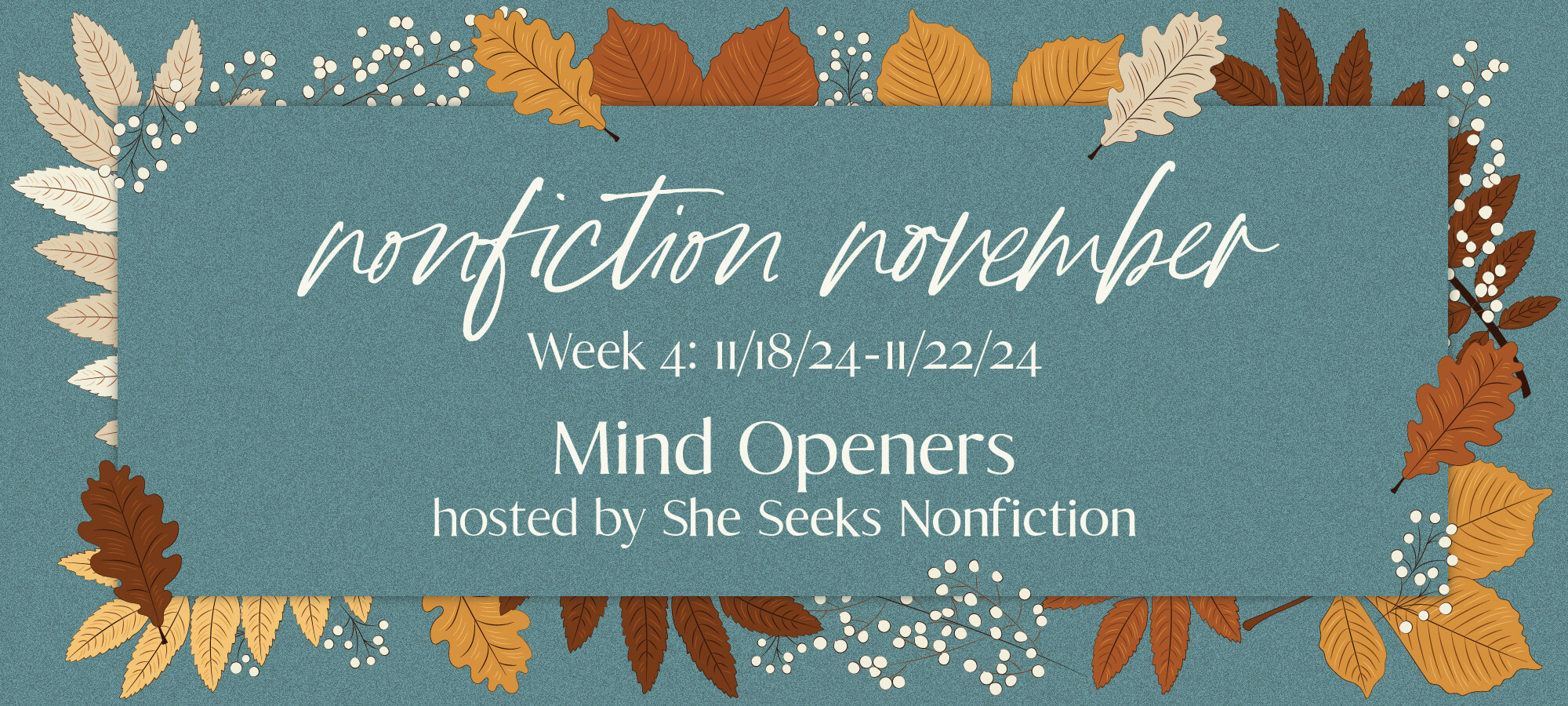
I can’t believe I am already hosting my third Nonfiction November! This week, I want to know what books really opened your mind this year. Here’s the prompt!
Nonfiction November 2024 Mind Openers prompt
One of the greatest things about reading nonfiction is the way it can open your eyes to the world around you—no plane ticket required. What nonfiction book or books have impacted the way you see the world in a powerful way? Is there one book that made you rethink everything? Is there a book that, if everyone read it, you think the world would be a better place?
I’ve loved introducing this prompt to Nonfiction November—first as Worldview Changers, then as Worldview Shapers, and now as Mind Openers. However I word it, I really just want to know if any books have shifted your perspective! These are the nonfiction books you’re thinking about long after you’ve finished them, aspects of which you keep seeing everywhere. They’re books that you find yourself repeatedly telling your friends to read.
Link up your post here or at the bottom of this post!
My mind opener book
Personally, I would have to say that the book that has most dramatically shifted the way I see things this year was Inventing Reality by Michael Parenti. Parenti lays out how the U.S. mass media has a conservative, capitalist bias that we may not see because it is covert. But I talked all about Inventing Reality in my Week 3 post (which I only got up on Saturday, oops!) so definitely check that out if you haven’t!
Instead, I want to tell you about a very different book that has certainly stuck with me all year. Disability Visibility: First-Person Stories from the Twenty-First Century, edited by Alice Wong, is a collection of essays by a diverse group of talented disabled authors, almost all of whom have intersecting marginalized identities.

Unspeakable Conversations
The book opens with a heartrending essay from the late disabled activist and lawyer Harriet McBryde Johnson. Johnson tells of her experience “debating” Peter Singer on the topic of, um… whether “it should be lawful under some circumstances to kill, at any age, individuals with cognitive impairments so severe that he doesn’t consider them ‘persons.’” Her opening paragraph will grab you and not let you go till somehow you’ve just finished the entire book.
He insists he doesn’t want to kill me. He simply thinks it would have been better, all things considered, to have given my parents the option of killing the baby I once was and to let other parents kill similar babies as they come along and thereby avoid the suffering that comes with lives like mine and satisfy the reasonable preferences of parents for a different kind of child. It has nothing to do with me. I should not feel threatened.
Harriet McBryde Johnson, “Unspeakable Conversations,” first published in the New York Times in 2003, republished in Disability Visibility in 2020
Disability Visibility
For how much this book impacted me, it was relatively easy to get through. Reading can be such a chore for me, despite it being one of my biggest hobbies—which is probably why I read so few books this year. Besides “Unspeakable Conversations,” the essay chapters are between four and 15 pages long. It was nice to have frequent “stopping points,” but I often had great trouble putting it down because of this. “I was going to stop here, but the next chapter is so short. What’s one more? Oh look, the next one is, too…” Hence why it’s so easy to just sit and read the entire book.
You can actually tell how Disability Visibility has changed my thinking right here in this post. My original title for this prompt was “Eye Openers,” but I thought that it would be better to use more inclusive language, especially as I’m highlighting a book by and about several blind, deafblind, or otherwise visually impaired people. Changing the title to “Mind Openers” isn’t a huge thing, but it shows you how books like these can help more folks adjust the way they think about some of the most marginalized people.
Alice Wong has another book out now titled Disability Intimacy: Essays on Love, Care, and Desire. I was hesitant to pick it up at first because I wasn’t too interested in reading about people’s “intimate” lives. After flipping through it, though, I realized that the essays are much more like those in Disability Visibility than I thought. The authors write about their relationships with pets, children, friends, and yes, sexual partners. I can’t wait to read it!
Link-up
What books have been mind openers this year for you? Link up your post below!







